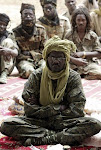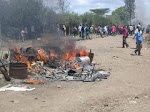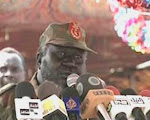In our previous features, "Integral" mentioned – amongst other common causes of disunity in South Sudan – tribalism, nepotism, land grabbing and occupation, greed for government power, tendency to promote lawlessness by deliberately ignoring to establish law and order and lack of interest in embracing democratic principles. It has already looked into tribalism and nepotism. For the new readers to get acquainted they should refer to Khartoum Monitor Newspaper issues no. 1564, 1568 and 1570 respectively. "Integral" will be looking at the third cause of disunity: land grabbing and occupation, in South Sudan today.
Land grabbing and occupation cannot be defined as a single word could be. However, since a definition is beneficial for the readers of "Integral", each and every one of these three English words will have to be defined separately.
Land means a solid part of the earth's surface or property consisting of land (Collins, 2000:348). Grabbing, on the other hand, means to snatch or seize (Collins, 2000:268). Occupation as an English synonym and amongst other meanings denotes possession or control (Collins' Thesaurus, 2000:420). Putting it in our context, the phrase 'land grabbing and occupation' in past tense form would mean 'land snatched and controlled' by someone who does not own it.
Land grabbing and occupation cases have been reported many a times in South Sudan. There are vast areas of land grabbed and occupied by people who do not own them in areas like Juba and Southern Bari areas in Central Equatoria; and Nimule, Budi and Kapoeta, in Eastern Equatoria. In Juba, peoples' pieces of land have been literally grabbed or seized. The latest example is the case that involved 'Home & Away building' (http://ohiyok-oduho.blogspot.com/search?updated-max=2008-04-14T04%3A33%3A00-07%3A00&max-results=7)। This building is built on the land or property of the late Dr. Ronald Voga, plot no. 52, in Juba.
Meanwhile, Internally Displaced Persons (IDPs) from Bor and Bahr Al Ghazal who were settled in Lobonok, Nimule, Budi and Kapoeta areas have literally refused to return to their original homes. These IDPs insist that they deserve to settle anywhere in South Sudan because they liberated it. In other words, they are there to stay whether anybody likes it or not. Most of these IDPs are from the Dinka tribe.
Land grabbing and occupation, however, a common phenomenon, especially in post war periods. It could become endemic when there no rule of law. Meaning that those armed with political or gun power could abuse it. This appeared to be the case with few individuals within the Dinka tribe who seem to be exercising tribalism, nepotism, land grabbing and occupation. This action is tantamount to behaviour of an occupying force or a colonial master, especially when government authorities turn a blind eye and seal off ears from seeing and hearing the practice respectively.
Using statements like: 'we deserve to settle anywhere in the South because we liberated it' is as unfortunate as it is disuniting. Land should be acquired through legal means but not seized by force of anything. It is unforeseeable that anybody from Equatoria, for example, would go to Bor, Gogrial, Aweil and Rumbek to claim somebody's land. Why then should some individuals within the Dinka tribe think that they have rights over other people's lands when all South Sudanese did contribute – in their own ways – to the struggle in South Sudan?
By grabbing or seizing what is not yours and sarcastically telling whoever has his/her land grabbed and occupied that, 'we deserve to settle anywhere in the South because we liberated it', a clear message is deliberately sent to those whose lands are grabbed and occupied that they are irrelevant in their own ancestral lands. A message as loud clear and deliberate as this will always continue to widen the gap of disunity in South Sudan. It was and remains to be this notion of making others irrelevant that is likely to disintegrate the entire Sudan, let alone the South.
In the last century, South Sudan went to the bush from as early as 1955; the people of the Southern Blue Nile, the Nuba Mountains and Eastern Sudan went to the bush in the 1980s-1990s; and the people of Darfur in 2003 of this century. One of the many reasons to fight was and remains to be common: the notion that other Sudanese are irrelevant in a country that is equally theirs.
South Sudanese had gone to the bush to fight in order to ensure freedom, equality and justice for all in the South, yet some South Sudanese audaciously refer to other South Sudanese as irrelevant. Is there any such thing as irrelevant between people of one country? This is unlikely. However, there are few individuals within the Dinka community in South Sudan who are seriously agitating for land grabbing and occupation. It is this group of individuals that the entire Dinka community needs to work to educate and discourage from causing disunity and any future conflict in South Sudan.
They should be told not to use – for land grabbing and occupation – an army like the SPLA, which is supposed to be for all South Sudanese and other SPLM areas and not a tribe or a party; a government like GoSS led by the SPLM, which is supposed to serve everyone in South Sudan and other SPLM areas and not the SPLM and the Dinka tribe; and a party like the SPLM, which includes people from other areas in the Sudan and not the Dinka alone.
No one is against the Dinka as the very individual trouble makers would want the rest of the Dinka to believe. They have always referred to articles that expose them as written by hired pens – hired by Jallaba – to be more precise. Why should anyone who tries to expose the few individuals within the South who are bent on causing disunity by using SPLA and SPLM to practice tribalism, nepotism, and grab and occupy lands that are not theirs be referred to as hired pen?
GoSS, under H.E. 1st-Lt-Gen. Salva Kiir Mayardit, has to triple its efforts and seriously work to activate the land commissions in GoSS and the states in order to do the jobs assigned to them by the Comprehensive Peace Agreement (CPA). It was unfortunate that the case of 'Home & Away' went to a civil court instead of a land commission tribunal. This was a mistake and one would hope that it is corrected in future by establishing land commission tribunals. These tribunals – in Juba and the ten Southern States – should be charged with the responsibilities of adjudicating land grabbing and occupation cases without prejudice. This is important, especially if GoSS is resolved that land grabbing and occupation will not only create disunity in South Sudan but is likely to ignite a future violent conflict in South Sudan.







No comments:
Post a Comment